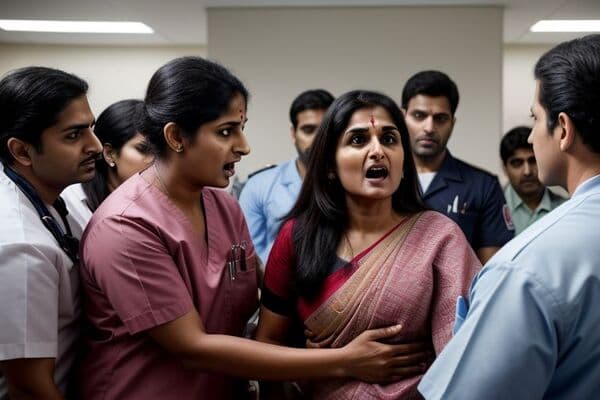Sun Dec 03 2023
Combating Violence: The Medical Professionals Act's Stand Against Attacks on Doctors in India

Abstract
The urgent need for the implementation of the Medical Professionals Act is emphasized in the face of escalating violence against healthcare professionals. Advocates stress the Act's significance in addressing the unique challenges faced by doctors, particularly in emergency settings where risks are inherent. The disparity in legal protections, compared to other professions like the police, raises concerns about the safety of healthcare heroes. Despite commendations for their efforts during the Covid-19 pandemic, instances of violence against doctors persist, underscoring the necessity for tailored legal safeguards. Beyond India, global recognition of such measures underscores the universal goal of ensuring the safety and well-being of healthcare workers.Introduction:
In recent times, an alarming surge in violence against healthcare professionals has prompted various medical associations to advocate for the implementation of stronger protective measures. The proposed solution, the Medical Professionals Act, specifically addresses the unique challenges faced by doctors in the line of duty. However, the response from the Home Ministry in India has raised concerns, citing the potential for similar demands from other professional groups.
Legal Disparities and Special Protections:
The Home Ministry's argument, while acknowledging general protections for all citizens, raises critical questions about the adequacy of existing measures, especially when compared to the specialized safeguards provided to other professions. Notably, the police force benefits from special protection due to the inherently perilous nature of their work, dealing with issues that pose a significant threat to their safety.
Addressing Unique Challenges Faced by Doctors:
Doctors, who often navigate life-and-death situations, find themselves lacking specific legal shields acknowledging the unique challenges they face. In emergency settings, where treating a patient carries inherent risks, doctors may prioritize self-preservation if they perceive a lack of protection in case of adverse outcomes. This defensive approach can lead to under-treatment, ultimately affecting the general public.
The Urgency of the Medical Professionals Act:
The argument that extending special provisions to doctors might lead to similar demands from other professional groups should not diminish the urgency of addressing the specific risks faced by medical professionals. Advocates for the Medical Professionals Act emphasize that doctors, balancing life and death daily, deserve tailored legal protections.
Silent Sacrifices:
The disparity in treatment becomes more glaring when examining cases where violence against doctors has resulted in fatal outcomes. Despite the grim incidents, the government's response remains silent, prompting concerns that the sacrifices made by the medical community are not adequately acknowledged.
Global Recognition and Legal Measures:
Beyond India, many countries worldwide recognize the need for specific laws or regulations to provide legal protection for healthcare professionals. These measures aim to address the unique challenges and risks faced by medical professionals. While specifics may vary, the overarching goal is universal: ensuring the safety, well-being, and professional integrity of healthcare workers.
International Examples:
In the United States, the Occupational Safety and Health Administration (OSHA) sets guidelines and regulations to protect healthcare workers from workplace hazards, including violence. The United Kingdom's National Health Service (NHS) has policies to address violence against healthcare staff. Various provinces in Canada, like Ontario, have legislation to protect healthcare workers from violence and harassment.
Call for Action:
Understanding that treating patients in emergency settings carries risks, the Medical Professionals Act becomes pivotal in ensuring doctors' confidence to prioritize patient care. It's crucial to recognize and address the distinct vulnerabilities of healthcare professionals globally, fostering a safe environment for those dedicated to preserving and enhancing community health.
Conclusion:
In conclusion, advocating for the Medical Professionals Act is not just a call from the medical fraternity but a collective plea to bridge legal gaps and ensure the safety of healthcare heroes who play a crucial role in safeguarding public health.
This Unlock the Future of Healthcare Management! 🚀🏥🌟
Is managing your hospital, clinic, or lab becoming a daunting task? Experience the ease and efficiency of our cutting-edge Management Software through a personalized demo.
